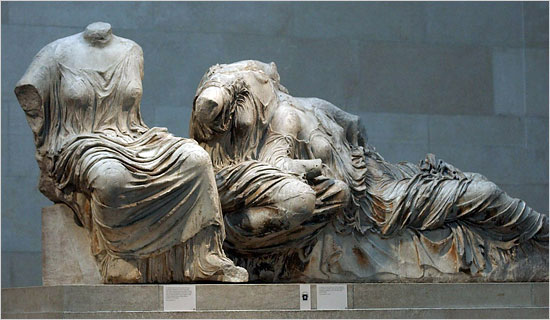 |
|
|
Italy Teams with Greece to Reclaim Antiquities |
|
Pooling their resources and diplomatic clout, Greece and Italy plan to forge a formal alliance to pursue the return of ancient artifacts from museums in the United States and Europe, the Greek culture minister has said. The agreement, which he expects to complete in early 2007, would cement recent collaboration between the two countries as both pursue increasingly muscular campaigns to get back prized Greek and Roman antiquities. Greece especially is focusing on recovering the Elgin Marbles from the British Museum. |
 Section of the Parthenon Marbles in London's British Museum |
| Outlining the strategy in an interview last week in New York, Culture Minister George Voulgarakis said Greece wanted to benefit from the Italians' growing expertise in tracking antiquities and mixing carrot-and-stick diplomacy with criminal prosecutions. "The Italians are very well organized — very, very well organized," Voulgarakis said. "Every country has its own policy and priorities, but we can help each other." [The J. Paul Getty Museum announced Monday that it would return to Greece two ancient works of art that Greece claims were illegally spirited out of the country, The Associated Press reported from Athens. Greece claims the works — a gold wreath dating from about 400 B.C. and a sixth century B.C. marble statue of a young woman — were illegally excavated and spirited out of the country. [It was unclear if the return would stop a Greek criminal investigation over the alleged theft of the wreath. Italy also has been seeking the return of several antiquities it claims the Getty obtained illegally.] In late November, Greek prosecutors opened a preliminary investigation of Marion True, the former antiquities curator at the Getty, focusing on her involvement in acquiring the wreath for the museum. And last week, Greek officials sent the Getty a new dossier of evidence, including documents and photographs, to support their claim for the wreath, whose place of excavation had previously been unclear. Italian officials have, meanwhile, indicated that they were prepared to drop their own separate claim for the stone statue, which was among 52 objects that Italy requested from the Getty last January. The conflicting claims had previously posed a potential barrier to the object's return to Athens. (In November, the Getty unilaterally decided to return 26 of the 52 objects to Italy after talks between the two sides broke down.) For countries seeking to claim antiquities in foreign collections and museums, the threat of legal action has become an important tool. In 2004, Italian prosecutors indicted True on charges of conspiring to import looted artifacts, and in recent weeks Italian officials have made it clear that the outcome of her continuing trial in Rome could depend in part on the Getty's willingness to meet the Culture Ministry's demands. Voulgarakis stressed that the Greek judiciary was independent of the government and that his talks with the Getty and other museums did not hinge on any legal proceedings in progress. The accord between Italy and Greece outlined by Voulgarakis would include provisions for both enforcement and cultural diplomacy. Because of their common interests and shared classical heritage, he said, the two countries might pursue some claims jointly and then determine which objects should go to which country. |
|
|
(Posting date 24 January 2007) HCS encourages readers to view other articles and releases in our permanent, extensive archives at the URL http://www.helleniccomserve.com/contents.html. |
|
|
|
|
2000 © Hellenic Communication Service, L.L.C. All Rights Reserved.
http://www.HellenicComServe.com |
|
